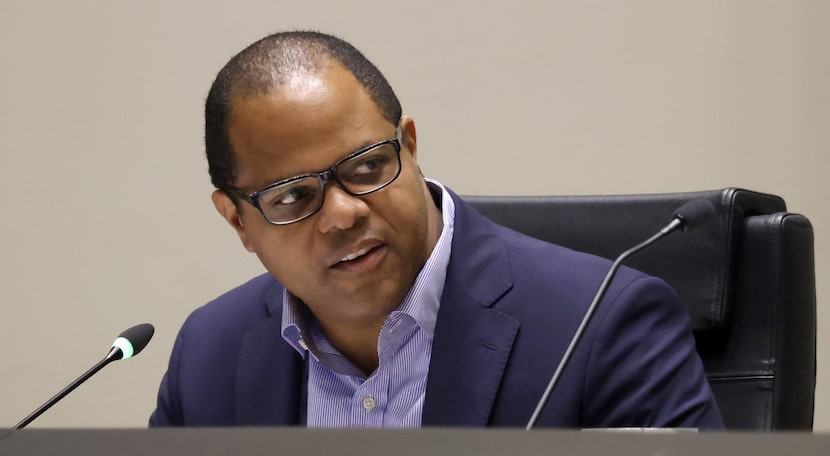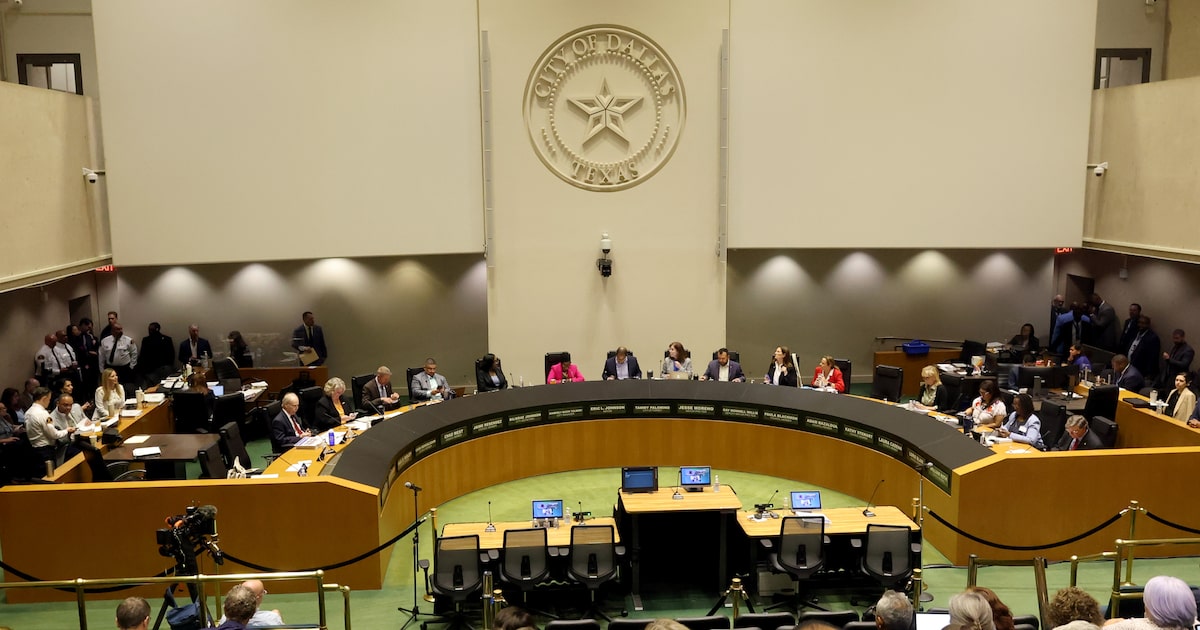The Dallas City Council approved a $5.2 billion budget early Thursday — the largest in city history — after a marathon session that stretched past 1 a.m.
The final vote was 11-3, with Mayor Eric Johnson, Mayor Pro Tem Jesse Moreno and council member Cara Mendelsohn opposing the spending plan. Council member Lorie Blair was absent for the vote.
The budget includes last-minute cuts, such as closing the Skillman Southwestern Branch Library, eliminating funding for state lobbyists and reducing other city expenses — primarily to lower the property tax rate. The council ultimately approved a tax rate of 69.88 cents per $100 valuation, slightly lower than the 69.97 cents proposed by City Manager Kimberly Bizor Tolbert and down from last year’s 70.47 cents.
Johnson and Mendelsohn were the only “no” votes on approving the new property tax rate. Mendelsohn and Moreno didn’t immediately respond early Thursday to requests for comment.
Political Points
Johnson said in a statement he couldn’t support the new budget because it still doesn’t provide enough relief for residents facing rising property values. The mayor has voted against prior budgets for similar reasons.
The council discussed around two dozen amendments Wednesday, though several were withdrawn. Many of the amendments came after Johnson challenged his colleagues on Sept. 12 to cut nonessential spending and direct those savings toward reducing the tax rate.
The City Council on Wednesday rejected proposals to shift $2.2 million in a city stipend from the Dallas Zoo, cut 10% from the Human Resources department budget to the tune of $427,873 and cut stipends to the Dallas Arboretum, Trinity River Audubon Center and Cedar Ridge Preserve by 10% or a total of $90,440. All were meant to reduce the property tax rate.
Related

Another proposal called for pulling around $4.5 million from a variety of sources, including the Dallas Zoo, to help increase pay for police officers and firefighters.
“Regrettably, the City Council did not support the majority of these amendments, resulting in a tax rate that remains too high, a rate reduction that will not offset rising property values, and higher tax bills for too many residents,” Johnson said. “As I said early in our budget discussions, if we are unable to cut even the low-hanging fruit that these amendments targeted, then we are unlikely to accomplish the much more difficult work that will be required to right size our city budget.”

Dallas Mayor Eric Johnson calls on a council member during a discussion on an amendment before a vote as the Dallas City Council assembled to approve the new $5.2 billion budget during a meeting in the council chambers at City Hall on Sept. 17, 2025.
Steve Hamm / Special Contributor
The budget includes heavy investments in police and fire services and increased funding for street maintenance. But it also features plans to close three community pools in the next fiscal year, combine four city departments to address housing-related issues and shut down the Skillman Southwestern library. City officials said in August the budget called for cutting 100 jobs and reallocating dozens of vacant positions, mostly to the police department, to help fund new hires.
The mayor defended the library closure even though it has drawn strong opposition from the community.
“This is about the fact that it was recommended to us based on data … that this library is not operating by any standard of the word efficiency,” he said.
The closure was approved after the council reversed its Sept. 4 support for keeping the library open by using $386,612 in federal ARPA funds originally earmarked for a program that helps largely southern Dallas homeowners connect septic systems to city water and sewer lines. The council approved redirecting that money instead to aquatics programs in southern Dallas and further reducing the property tax rate.
Deputy Mayor Pro Tem Gay Donnell Willis acknowledged that the city manager’s original budget included many resident priorities such as increased street spending and pay raises for police and fire. However, she criticized the amendment process.
“Other cities don’t go through an amendment process like this. Making some decisions last minute is just not strategic, or smart,” Willis told The Dallas Morning News.
“I think we’ll have to see how some of the cuts play out. It’s easy to say these are things that we can cut that people won’t feel. Well, in a few months, we’ll know for sure.”
The budget reflects rising costs for residents. Although the property tax rate is decreasing for the 10th straight year, utility fees — including water, wastewater and sanitation — are increasing. The city is also raising its minimum wage for municipal employees to $21.50 per hour from $19.25 and expanding the property tax exemption for seniors and residents with disabilities to $175,000 from $153,400.
The combined budgets for the Dallas Police Department and Dallas Fire-Rescue total $1.2 billion, a 5% increase from last year’s spending. This budget is the first since Dallas voters approved a charter change last fall, requiring increased annual police-related spending to strengthen the pension system, boost starting pay and benefits to be among the top five in Dallas-Fort Worth, and maintain a police force of at least 4,000 officers. The city has more than 3,209 police officers as of Wednesday and aims to reach 4,000 by 2029.
The police department’s budget is proposed at $758 million, up from $719 million last year, while Dallas Fire-Rescue’s budget is set at $453 million, an increase from $429 million. The city plans to hire 350 new police officers and retain enough officers to reach around 3,400 by fall 2026. The city also aims to maintain around 3,200 firefighters.
Starting salaries for police officers and firefighters will rise to $81,232, up from $75,397. The city plans to fully fund the police and fire pension system within 30 years, gradually increasing contributions based on actuarial calculations rather than at a fixed rate. This year’s budget includes a $225.7 million contribution to the pension system, up from $205 million, with plans to contribute $247.1 million starting in October 2026.
The city is allocating at least $162 million for street improvements and maintenance, covering 750 lane miles — up from 710 lane miles last year.
The budget also includes organizational changes, such as merging the offices of Community Care and Empowerment, Equity and Inclusion, Homeless Solutions, and Housing and Community Development into a single department called the Office of Housing and Community Empowerment to save $6.2 million. The city will allocate $10 million to help transition homeless individuals from shelters to stable housing.
Some of the final budget adjustments included:
- Eliminating $339,000 for state legislative lobbying contracts and redirecting the savings to lower the tax rate
- Cutting $97,059 for five city memberships and reallocating the funds to traffic safety improvements
- Reducing department budgets for furniture, food and marketing services by a combined $672,389 to further lower the tax rate
- Shifting $200,000 to the City Controller’s Office to pay for pension investment consultation services for the Dallas Police and Fire Pension Fund and Employees Retirement Fund
Several residents urged the City Council on Wednesday morning to reconsider budget decisions, particularly regarding the Skillman Southwestern Branch Library and other community services.
Nora Soto argued the city is ignoring residents’ needs by prioritizing police funding over essential services such as libraries and housing.
“Everyone in Dallas deserves to have their basic needs met in order for the city to thrive,” she said. “You need to structure this budget with that in mind.”
The city is developing a new strategy for its entire library system, which is expected to take at least a year. Dallas Public Library Director Manya Shorr has proposed moving to a regional model, with fewer locations but longer operating hours. Skillman Southwestern is the only library that will close because of this budget, but up to four other sites could face closure next year, city officials have said.
Ken Benson, former chair of the Friends of the Dallas Public Library, acknowledged that library systems across the country are evolving and that Dallas could deliver services more efficiently. However, he stressed that this transition requires thoughtful discussion about what is best for the city and its residents. Benson pointed out that the council lacks key information, such as why Dallas has 30 library branches, the impact of closing branches in specific areas and the implications of shifting to a regional library model.
“You don’t have any of those facts, and yet you’re proposing in today’s vote to close one branch library,” he said, “and then next year, in your proposed budget, to close four more.”
